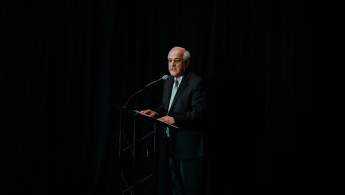PLO formally requests membership of the ICC
The Palestinian envoy to the United Nations Riyad Mansour Friday formally requested membership of the International Criminal Court (ICC), a move that paves the way for Palestinians to sue Israel for war crimes.
Membership of the Rome Statute, which governs the ICC, would open a way for Palestinians to pursue criminal complaints in The Hague, but is firmly opposed by both Israel and the United States.
| We are seeking justice for all the victims that have been killed by Israel. - Riyad Mansour, UN envoy |
"This is a very significant step," Mansour told reporters in New York. "We are seeking justice for all the victims that have been killed by Israel, the occupying power."
UN Secretary General Ban Ki-moon is to review the letters and notify state members on the request within 60 days.
The move comes hot on the heels of the failed attempt to secure a UN Security Council Resolution that would have stipulated an end to Israel’s occupation of East Jerusalem, the West Bank and Gaza by the end of 2017.
Palestinian Authority President Mahmoud Abbas signed the ICC application papers on Wednesday, a day after the resolution came one short of securing the nine votes needed for adoption, even if the United States was poised to wield its veto power.
Retroactive jurisdiction
Palestinians, moreover, are also seeking to grant the ICC in the Hague retroactive jurisdiction, said Qais Abdel Karim, a senior PLO official, a move that could open up Israel to prosecution for crimes committed in its 51-day assault on Gaza in 2014, in which 2,200 Palestinians were killed including more than 400 children.
“The application stresses the right of Palestinians to exercise their right to sue Israel for crimes committed prior to joining the ICC,” Abdel Karim told al-Araby al-Jadeed.
Saeb Erekat, the senior Palestinian negotiator to long-stalled US-mediated peace negotiations with Israel, said Palestinians would now seek ICC investigations into the Gaza assault as well as Israeli settlement building in occupied territory, prohibited under international law.
He also suggested that joining the ICC was just a first step, and that Palestinians would now look to embed themselves more deeply in the institutions of the international community, especially those where the US or other powers can’t block membership.
“No force can stop us joining the ICC and other international institutions,” Erekat told al-Mayadeen TV station.
The Palestinians were upgraded from observer status to a UN "observer state" in 2012, opening the possibility for them to join the ICC and a host of other international organizations.
Israeli Prime Minister Binyamin Netanyahu urged the ICC to reject the request, arguing that the PA did not rank as a state.
But ICC chief prosecutor Fatou Bensouda has already said that Palestine qualified to join the Rome Statute since that 2012 status upgrade.
Whether or not the Palestinians can lodge complaints for events prior to 2012 remains unclear, though most experts suggest it is unlikely. The Rome Statute came into effect in 2002, but the Palestinians were not then considered a state.
Unforeseen consequences
Moreover, Palestinian factions could also find themselves fending off accusations of war crimes, should rocket fire from Gaza, for instance, be deemed indiscriminate.
And if the application is successful, the PLO still needs to refer cases to the ICC before any action is taken. The Palestinian leadership stalled for over two years before submitting an official application, in part to use as leverage in negotiations with Israel, in part as a result of US and Israeli pressure.
Both those factors will still come into play, suggested Salma Karmi-Ayyoub, a UK-based criminal law barrister and external consultant for the Palestinian human rights organisation, Al Haq.
“The real test of the PA’s resolve to bring a case starts now,” she said. “The Palestinians still need to refer a case to the prosecution and actively cooperate with an investigation.”
Without that political will, Karmi-Ayyoub said, the Palestinian leadership might still try to use the ICC as a “bargaining chip” and be susceptible to external pressure.
Nevertheless, she told al-Araby al-Jadeed, the step was “crucial”, not only for the options it opens up to Palestinians but for the potential unforeseen consequences.
Palestinian ICC membership would clear the way for individual and civil society suits against Israel, though these are unlikely to go far, since they depend entirely on the discretion of the ICC prosecutor.
However, not so with states, and the Palestinians are – if ICC members – not the only ones who can lodge complaints.
“Assuming that the application is accepted, other states can also refer Israeli crimes against Palestinians to the prosecutor, even without PA approval,” she said. “This is why this is such an important development, and it could lead to unforeseen consequences.





 Follow the Middle East's top stories in English at The New Arab on Google News
Follow the Middle East's top stories in English at The New Arab on Google News
![Netanyahu furiously denounced the ICC [Getty]](/sites/default/files/styles/image_330x185/public/2024-11/GettyImages-2169352575.jpg?h=199d8c1f&itok=-vRiruf5)
![Both Hamas and the Palestinian Authority welcomed the ICC arrest warrants [Getty]](/sites/default/files/styles/image_330x185/public/2024-11/GettyImages-2178351173.jpg?h=199d8c1f&itok=TV858iVg)
